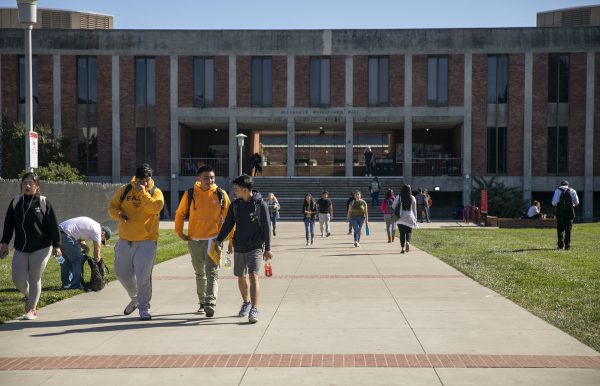Chinese students choose a home
June 10, 2015
Gowns, caps, and tassels — another graduation season is here. The final week of spring quarter means a new chapter for graduates. It’s a period of high anxiety, uncertainty and decision-making as many enter the competitive job market, but for many Chinese International students in the U.S. the core question is which country to choose: China or America?
There are 37,500 Chinese International students in the San Francisco Bay Area, according to official Chinese Embassy records. They are an ethnic minority on American university campuses; sometimes confused with other international students from Japan or Korea; often, professors say, they appear shy. Still, as years of western education have challenged their traditional culture, many Chinese International students say their choice to stay is based on a unique perspective of themselves — straddling cultures and transferring their skills.
“I’d like to stay here [in the United States], definitely. Because, it is my American Dream,” said Yaqiong Guo, a Cal State East Bay graduate who majored in accounting. “To work in the U.S. was my goal even before I came here. Thus, I am going to do anything that could help me stay.”
I’m going to graduate this year. Ideally, I hope I can get a job in China and the salary can be about 10,000 RMB [$1,611.37 in U.S. currency] monthly. But the reality is not optimistic.
— Wenyi Xu
Guo echoes the sentiments of many Chinese international students in the Bay Area. Some choose to continue on to graduate schools, others look for an internship. If neither works, they have to leave to face other challenges in China.
Guo is now preparing for her Certified Public Accountant examination; she also has been accepted into Prudent University’s graduate school. She has internship experiences both in China and America, but she prefers working in the U.S. because she said she finds fair payment more attractive.
“In U.S., how much you earn is proportional to how much effort you put in your work. But in China, this is not always the case,” she said.
She and other students point out that an American university diploma, by itself, has become less valuable than before because so many students have been studying here in recent years. Of course, some students say, an Ivy League school diploma makes a difference, but the majority of Chinese International students in the U.S. don’t pursue that route because of how competitive the application process is. Consequently graduates seek to add an advantage – additional skills through an internship.
“The most useful thing I learned here may not always be my professional knowledge, but is being open-minded,” Guo added. “With the diversity here, I learned understanding things in different aspects and always being critical. In China, we are more likely thinking on one side of an issue.”
She and other business and liberal arts students agree that analysis and questioning to is rarely encouraged in Chinese education.
“I [learned] how to critical thinking here. A lot of classes emphasize on it. But it’s a very vague concept in Chinese higher education,” Yuchang Liu, a student at CSUEB majoring in business administration said.
According to the Chinese Blue Book of Returnee Employment, 353,500 students who studied overseas returned to their home country in 2013.
Of those, 63 percent had a master’s degree, 30 percent had a bachelor’s degree and six percent had a doctorate. Those who held a master’s degree or doctorate degree could expect a monthly salary between $806.28 to $1,612.57, while people who do not have a bachelor’s degree could expect $806.28, according to the Blue Book.
According to a report from the Chinese Academy of Social Sciences, it explained that in China’s job market, there is little difference between the salaries of a student who has studied overseas and that of a local university graduate.
“I’m going to graduate this year. Ideally, I hope I can get a job in China and the salary can be about 10,000 RMB [$1,611.37 in U.S. currency] monthly. But the reality is not optimistic,” said Wenyi Xu, a student at San Jose State University.
Unlike Guo, she is not interested in American culture, and prefers to work in the big cities in China. “I had to prepare both ways,” said Guo. “One is applying for an OPT (Optional Practice Training), if it can lead me to an H1-B visa (permits the bearer to work in U.S.) which is perfect, I can stay here; if not, the working experience in a foreign company also benefits me when I go back to China looking for a job.”
An internship in an American enterprise adds value to an international student’s experience. After graduation, a one-year OPT is a popular choice for the Chinese International students.
Whether in China or the United States, working experience is the most important factor in a job application resume, especially when the experience is related to the industry the applicant will join.
Sometimes the skills that students learn in the U.S. may not always transfer well or lead to favorable jobs. For example, journalism practiced in the U.S. is different in China press where a supervisor or editor has the final say on whether a story is published because of government censorship. Yifan Wu, a journalism major student at CSUEB, explained that looking for a job as an anchorwoman in China was really difficult.
“It’s hard to practice my broadcasting knowledge in a local Chinese television station,” Yifan explained. “Their rundown and news routine is totally different. You need to be really careful about the word you manipulate to avoid provoking the censorship department.”
Yifan gave up seeking positions in the mainstream media and turned to a sub-culture media company. She finally got a job at Bon TV, an English-language television news network, as an anchorwoman in China.
On the other hand, STEM —science, technology, engineering, and mathematics— major graduate students have fewer problems to transfer their skills working in China.
“The development of technology in U.S. is definitely faster than China, so I believe my computer science knowledge will advance me among the competitors,” said Zhen Wu, a CSUEB computer science student.















